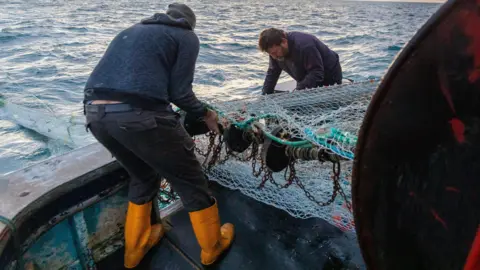The recent announcement of a new deal between the United Kingdom and the European Union marks a significant moment in the post-Brexit landscape. Political reporters have eagerly awaited the specifics, which are intended to redefine relations in various sectors including fishing rights, trade, and defense. After extensive negotiations, both parties hope the deal will establish a framework conducive to cooperation and mutual benefit, while providing clarity and reassurance to stakeholders across the channels.
The announcement, published just a brief time ago, outlines the preliminary information regarding various sectors impacted by the deal. It is expected that the full details will be unveiled shortly, providing further insights into what the future holds for UK-EU relations, which have been under considerable scrutiny since the Brexit vote. The anticipation surrounding the deal is palpable, as it represents an opportunity for both the UK and EU to signal a move towards a more collaborative framework.
One of the crucial components of this newly forged agreement pertains to fishing rights. Under the deal, the status quo will be maintained, allowing EU fishing vessels continued access to UK waters until 2038. This provision comes as a relief to many, considering the previous 2020 Brexit deal that enabled the UK to regain 25% of EU fishing quotas, a measure set to expire in the coming year. As part of this new arrangement, the UK has committed to negotiate yearly quotas with the EU and Norway, while also issuing licenses to regulate fishing activities in its territorial waters. Furthermore, the UK government is anticipated to announce a substantial £360 million “fishing and coastal growth fund,” aimed at fostering development within coastal communities.
Agricultural exports are another vital discussion point. In exchange for the extension of fishing rights, the UK has successfully negotiated reduced checks on food products sent to the EU. Consequently, officials will eliminate some routine border inspections concerning animal and plant exports. The new sanitary and phytosanitary (SPS) agreement allows the UK to resume selling certain food items, such as raw burgers and sausages, into the EU for the first time since Brexit—a crucial lifeline for UK-based producers.
The agreement also emphasizes enhanced security collaboration between the UK and EU. Both parties are forming a formal defense and security pact, spurred on by rising global tensions and emerging threats. The necessity for closer cooperation was highlighted by crucial geopolitical events, including Russia’s invasion of Ukraine. With this new framework, the UK aims to grant its arms manufacturers access to the Security Action for Europe (Safe), a £150 billion EU fund designed for supporting defense projects.
In an encouraging development for youth engagement, the deal encapsulates plans for a “youth experience scheme.” While this program will require further negotiation, it fundamentally seeks to recreate opportunities for young people to work and travel freely across European borders. The British government envisions a system akin to existing arrangements with countries like Australia and New Zealand, which allow individuals aged 18 to 35 to work in each other’s nations for up to three years with annual visa quotas.
Additionally, British travelers can expect enhanced convenience through the use of e-gates at a greater number of European airports, effectively improving their travel experience. The new regulations will simplify travel documentation for pets, thereby removing the cumbersome requirements for repetitive veterinary certifications.
Another critical aspect the deal addresses is carbon taxation; the UK and EU have agreed to connect their carbon markets, thereby preventing additional taxes on goods like steel and cement exchanged between the two. This arrangement aligns with the UK’s independent carbon system that emerged following the exit from the EU’s Carbon Border Adjustment Mechanism (CBAM). The UK government asserts that this strategic alliance is expected to save approximately £800 million in taxes, further protecting the British steel industry from EU tariffs.
In conclusion, the newly established UK-EU deal brings forth a renewed perspective on the post-Brexit relationship, focusing on crucial areas ranging from fishing, agricultural trade, security cooperation, youth exchanges, animal travel regulations, and carbon markets. As details unfold, stakeholders from various sectors will be watching closely to gauge how these developments impact their interests and the broader UK-EU dynamic.



